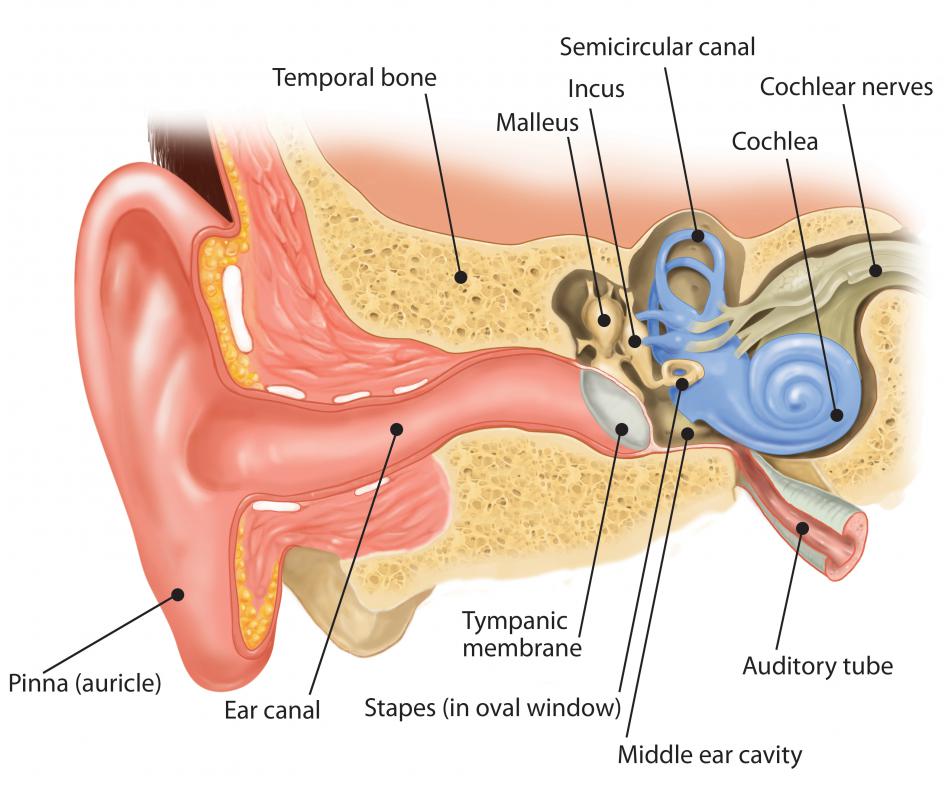At WiseGEEK, we're committed to delivering accurate, trustworthy information. Our expert-authored content is rigorously fact-checked and sourced from credible authorities. Discover how we uphold the highest standards in providing you with reliable knowledge.
What Factors Affect Pitch Perception?
Once sound enters the ears, it is processed by the physical components of the middle and inner ear and by the auditory centers of the brain. Pitch perception is affected by several factors, including the nature of how sound is processed in the body. Neural coding in the brain has an effect on how humans hear sound. The presence of multiple sounds, changes in volume, or frequency of sound pulses can affect how pitch is perceived. Theories that have attempted to define pitch perception include place theory and temporal theory.
Sound enters the ear and is first processed by the ear drum, or tympanic membrane. It then translates to movements in three small bones before passing into the cochlea, a spiral organ in the inner ear with hair cells that move with sound waves. The motion of the hairs translates to signals that get passed into the auditory nerve. Different frequencies are picked up by different parts of the basilar membrane inside the cochlea, as explained by place theory. This theory also describes how high harmonics close together are not perceived to be separate.

Theorists have also speculated that sound is perceived in relation to time, known as temporal theory. Nerve cells fire at periodic time intervals, but also serve to analyze frequency. A combination of the two theories helps in researching the nature of sound perception in humans. Neural activity in the auditory cortex has a profound effect on pitch perception, with pitch changes stimulating areas in the right hemisphere. Problems in the right temporal areas of the brain sometimes affect how someone is able to detect pitch changes.

The inability to understand pitch change is part of being tone deaf. When melodies are transposed to different keys, the relative pitch of each note is generally perceived. Sound intensity also has an effect on pitch perception. Increases in intensity for high frequency sounds will make them sound like the pitch is rising. Raising the intensity of low frequency sounds makes them sound like the pitch is getting lower.

Sounds that are pulsing or sustained also have a different pitch perception. Compared to a steady pulse, sound pulses with decreasing amplitude seem to have a higher pitch. Noises and tones that are heard over one tone can change its apparent pitch as well. Pitch perception is therefore affected by internal and external factors. A sound that remains steady in pitch sometimes seems to be changing as heard by the human ear.
AS FEATURED ON:
AS FEATURED ON:













Discussion Comments
@StarJo – I noticed that when a fire truck went by last week! I commented to my brainy coworker about the pitch change, and he gave me some long explanation involving crests and wavelengths.
I can't remember it all, but I do know that the reason for the change was the motion of the truck. I think that it caught up with the sound wave it emitted before it reached me, and the difference in the length of the waves caused a pitch change.
Has anyone else ever noticed the change in pitch of a siren or car radio as it goes by? I was standing outside my house one day when an ambulance was approaching, and before it got to my driveway, it sounded high pitch.
As it drove by, the pitch changed. Once it passed my house, the pitch sounded much lower. It was very strange.
I've noticed the same thing about songs on someone's car radio. After they whiz by me, the song seems to change key! I find it fascinating. I know there has to be a scientific explanation for it, but I'm clueless as to what it is.
@shell4life - People like your uncle make the best singers. I love listening to people with a great perception of pitch singing, because it gives me chill bumps!
I am an all right singer, but I am really good at playing the piano. I have a good pitch perception, and I can transpose a song to a different key without reading music.
I play mostly by ear, and my pitch perception is what allows me to do that. I can pick out a song on the piano just by hearing it in my head and matching up the pitch.
I have met other piano players who can only play what is written down in front of them. Their pitch perception is not as strong as that of people who play intuitively, though they are still talented musicians.
Some people are able to hear and make pitch changes with uncanny accuracy. These people are referred to as having “perfect pitch.”
My uncle is one of these people. I have never heard him sing a bad note or even one slightly off key.
He can hear little inflections that affect the overall pitch. I like watching singing competitions with him, because he can always predict who the judges will scold for being off key. Personally, I can only tell someone is off if they are way out of tune, but he is sensitive to every little sound.
Post your comments